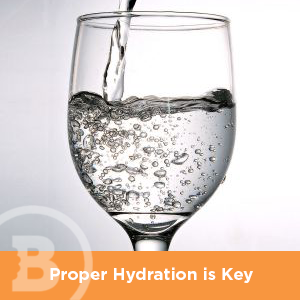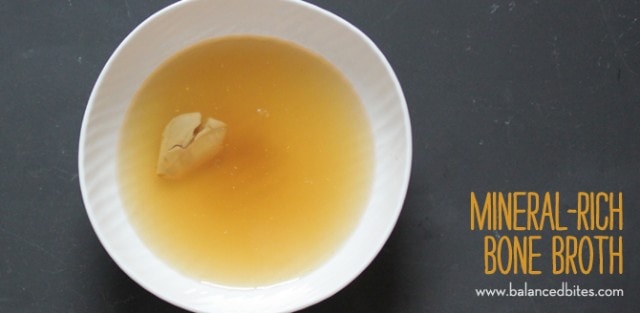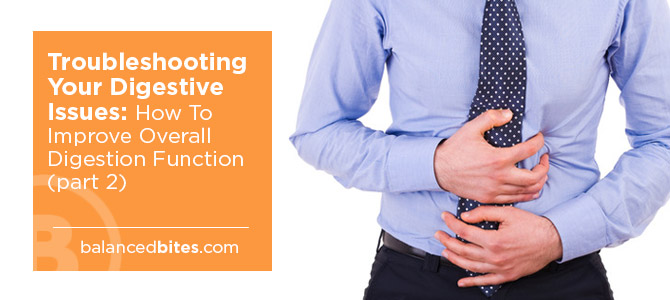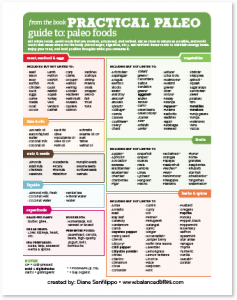In Part 1 of Troubleshooting Your Digestive Issues I covered some signs and symptoms (diarrhea, constipation, bloating, gas, etc.) and potential causes of disrupted digestion and why it’s important to address these issues right away. Remember, sixty to eighty percent of the immune system is in your gut-we want to do what we can to support it.
Improving digestive function is the first step to calming systemic inflammation.
In Part 2, I’ll provide some general tips for the most common signs and symptoms and in Part 3, I’ll recommend some addition steps to address constipation and diarrhea specifically.
Tips to improve digestion:
Start with a top down approach (North-to-South process)
 Get in a relaxed state before eating. Sit, take a minute for gratitude (“Rest-and-Digest”), and chew your food thoroughly.
Get in a relaxed state before eating. Sit, take a minute for gratitude (“Rest-and-Digest”), and chew your food thoroughly.- Support appropriate stomach acid – your stomach’s hydrochloric acid (HCL) status has significant power of what happens throughout the rest of the digestive process-it is so important, I wrote an entire post on it: Why You Want More Stomach Acid Not Less (also referenced above). On a basic level, HCl, sterilizes your food and helps you break down and assimilate important nutrients. Most people do not have enough or acidic enough stomach acid. To stimulate it, try a small amount of lemon juice or apple cider vinegar (about 1 -2 tablespoon) in 1-2 ounces of water or ¼ cup of sauerkraut* or digestive bitters 10-15 minutes before your meal. See the referenced post for more information increasing stomach acid. Drink water between meals to maintain stomach acid concentration (sipping water as needed during a meal is okay).
- Support biliary function – bile (made by your liver and stored and released by your gallbladder, helps to digest fat). Your stomach acid must be the right pH for the bile to release, so make sure you support that first. You can add beets, radishes, leeks, or asparagus to your diet support healthy gallbladder function-also consider digestive bitters. Short or medium chain triglycerides such as coconut or palm oil do not require bile for digestion so they may be a good choice during the healing process. No gallbladder? Check out an earlier post by Stacy of Paleo Parents about how to eat without a gallbladder.
- Support your pancreas – actually, supporting your HCl and your biliary function as recommended above, will support your pancreas to release the necessary digestive juices, which, in turn, assists the rest of the digestive process. Consider digestive enzymes for additional support (assuming stomach acid and gallbladder are being supported).
 Proper hydration – besides replenishing your body with water after exercise (and if you have diarrhea), know that most beverages (including our beloved kombucha) besides water and some herbal teas are considered diuretics, so make sure you are replenishing your body with water when you consume those. Drink ½ your body weight in ounces plus 1.5 times diuretics up to 100 ounces- add a pinch of unrefined sea salt in your water to support electrolyte balance.
Proper hydration – besides replenishing your body with water after exercise (and if you have diarrhea), know that most beverages (including our beloved kombucha) besides water and some herbal teas are considered diuretics, so make sure you are replenishing your body with water when you consume those. Drink ½ your body weight in ounces plus 1.5 times diuretics up to 100 ounces- add a pinch of unrefined sea salt in your water to support electrolyte balance.- Reduce Stress – this can have a big impact on your digestion. Make it a priority to take some time for yourself-you will be more productive for it. Remove yourself from toxic environments and people. Seek out activities that bring you joy. Do not eat in a state of stress. Did you read Chris Kresser’s post referenced earlier: How stress wreaks havoc on your gut – and what to do about it ? Paul Chek’s article, also linked above, also addresses how stress effects digestion.
- Address medications that may cause disruptive digestion with your physician.
 Consume Mineral Rich Bone Broth – nourish your body with one of the most healing and nutrient dense whole foods.
Consume Mineral Rich Bone Broth – nourish your body with one of the most healing and nutrient dense whole foods.- Probiotics – promote healthy gut bacteria with probiotic rich foods such as sauerkraut*, kimchi*, and other fermented veggies. You can experiment with probiotic supplements but know that they are tricky. Some brands I recommend are Klaire Labs and Prescript Assist. You may want to consider working with a holistic practitioner for help with probiotic supplementation.
- Avoid Starchy/sugary foods – If you suspect SIBO/dysbiosis/candida, cut back on starchy/sugary foods beyond the FODMAPS such as sweet potatoes, fruit, and “paleoized” desserts until you are healed, to avoid feeding the bad bacteria. Listen to: Balanced Bites Podcast: Episode #8 with guest Chris Kresser on digestion
- Sip soothing herbal teas such as peppermint, ginger, marshmallow root, and slippery elm.
- Avoid alcohol-it can promote a leaky gut.
Perhaps the most important step you can take to improve your digestion is to address potential food allergies/sensitivities/gut irritants using the 4R Protocol.
The following is an excerpt from “Guide to: Healing a Leaky Gut” in my book, Practical Paleo.
Remove
Common dietary irritants, such as processed and refined foods, alcohol, grains, legumes, dairy, refined seed oils, and sugar. If you have already removed those foods, remove nuts, seeds, coffee, and eggs to test as the next steps.
Anti-inflammatory medications, specifically NSAIDs. Work on preventing the need for NSAIDs via diet and lifestyle.
Repair
Eat adequate omega-3 fatty acids to balance out the naturally high omega-6 diet that most of us eat.
Eat adequate amounts of soluble fiber in starchy vegetables or fruits like sweet potatoes, butternut squash, and plantains.
Drink adequate amounts of water to prevent constipation and dehydration.
Supplement the amino acid L-glutamine in water between meals to help with gut lining repair (5-8g per day)
Supplement omega-3 and fat-soluble vitamin rich fermented cod-liver oil/butter oil blend (1/2-tsp per day) – Green Pasture brand.
Supplement quercitin, a powerful antioxidant to help with inflammation and DGL (deglycerized licorice) to promote the repair of the mucosal lining of the gut.
Reinoculate
Eat probiotic foods like raw sauerkraut* or other fermented vegetables.
Supplement with probiotics in pill or powder form if desired. Note: See probiotic recommendations earlier in this post.
Reintroduce
Eat one of the eliminated foods at each of your meals on day 31 after the elimination and note any changes to your mood, energy, mental clarity, digestive function, and your skin. Repeat the reintroduction of one eliminated food every three days to discover which are causing problems and which are not.
Note: the reintroduction of gluten containing grains is not recommended.
* Avoid raw and fermented goitrogentic vegetables (like cabbage) if you have a hypothyroid condition. Paleo foods with goitrogens are denoted on my free downloadable Guide To Paleo Foods.
In Part 3 of this series, I’ll present additional recommendations for constipation and diarrhea. However, following the general recommendations given here will go a long way to improving most symptoms of disrupted digestion-calming systemic inflammation and paving the way to optimal health.
Parts in this Series:
Part 1: Signs & Symptoms of Digestive Upset
Part 2: How to Improve Overall Digestion Function
Part 3: Specific Recommendations for Constipation & Diarrhea



Comments 10
just what I needed now, I’ve been 100% paleo for the last almost 2 years it has work perfect, I’m moving this weekend so I went back to use some bleach for cleaning after that I got diarrhea and my bones hurt that has been already 3 days, do you have any other recommendation for me. I already started wth the herbal tea infused gelatin, the broth and lots of water. tku!
Thank you so much for these posts on digestion! I don’t have a gall bladder, and I’ve been paleo for over a year. I recently started having some pretty severe problems in digestion, and your book (and blog posts) have really helped. Thank you so much for all you do!
I love adding ACV to my water. I was always curious about how frequently I should be doing this, though. I put about 2 TBSP in my water before breakfast in the mornings and then drink water between my meals during the day. What are your thoughts, sweetie?
I’m confused, it said to avoid sweet potato then further down it said to eat sweet potato. Which one is it?? And it also said to avoid paleoized desserts. Why is that?
Sweet potatoes are great for digestion except “If you suspect SIBO/dysbiosis/candida” – as written above. Paleo-treats can be VERY heavy in nuts, which are often tough to digest if you are struggling. This isn’t a general “how to be healthy all the time” post, it’s specific for those struggling with their digestion. Hope that helps!
Hi, I was wondering if you do a FODMAP free diet, specifically for IBS, low stomach acid and a history of candida overgrowth, should you also go NightShade Free?
Not necessarily, though some nightshades are sometimes considered FODMAPs as well (peppers I’ve seen in a few FODMAP lists). It really depends on what’s going on with your body.
thank you for responding! that seems to be the conclusion I’m finding as I’m doing more research. I know each case is completely different and everyone reacts differently to various foods. I think I will start with FODMAPs and then go from there (nightshades, etc.) and see how my body responds. Thanks so much!
I’m sorry, just one more question…is arrowroot flour/starch and tapioca flour/starch considered a FODMAP as well? I am finding very little information on the web regarding this one and would appreciate clarification. Thank you!
Thank you for all the relevant information! Very well written and easy to follow, Diane!